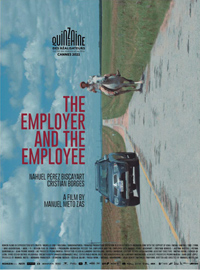Bargaining Basement: Zas Presents a Touch of Caste in Free Market Melodrama
 The working class do not go to heaven in Manuel Nieto Zas’ third feature The Employer and the Employee, which is about as apt a title to indicate the enduring tensions between the haves and the have nots. Arriving amidst a flurry of film festival titles concerned with the same issues, where draconian systems remain fueled by the unsustainably of capitalism’s fruits are cultivated from the blood of the proletariat, Zas concocts an old-fashioned melodrama defined by cyclical fate. Emotionally estranged from both sets of families who seem locked in a symbiotic codependency neither party seems interested in dismantling, Zas resists emotional manipulation in favor of cold observation. In the same sense, he taps into formulations as ancient as Greek tragedy, where hubris demands sacrifice of what two men secretly desire most.
The working class do not go to heaven in Manuel Nieto Zas’ third feature The Employer and the Employee, which is about as apt a title to indicate the enduring tensions between the haves and the have nots. Arriving amidst a flurry of film festival titles concerned with the same issues, where draconian systems remain fueled by the unsustainably of capitalism’s fruits are cultivated from the blood of the proletariat, Zas concocts an old-fashioned melodrama defined by cyclical fate. Emotionally estranged from both sets of families who seem locked in a symbiotic codependency neither party seems interested in dismantling, Zas resists emotional manipulation in favor of cold observation. In the same sense, he taps into formulations as ancient as Greek tragedy, where hubris demands sacrifice of what two men secretly desire most.
The employer (Nahuel Perez Biscayart) is a distracted, middle-class rural producer of a farm inherited by his successful father. At home, he’s dealing with the possibility of his infant son’s potentially alarming health issues, while at work he’s had trouble finding help to work the land and in desperate need of a combine harvester. His father recommends an old employee, Yanni Lacuesta, but the man’s physical health has been depleted by years of hard labor. Instead, Lacuesta offers his son Carlos (Cristian Borges), who gladly accepts, with a wife and newborn of his own to care for. The silver lining of the arrangement is a horse owned by his employer, who Carlos will be allowed to train for an upcoming horse race, the success of which would allow financial opportunities for both parties. But an accident at work suddenly claims the life of Carlos’ son, compromising a superficial but affable working relationship. His employment continues, as do plans for the race. But further tragedy awaits.
The simplicity of the narrative is reminiscent of classic American literature, where Steinbeck or Hemingway delivered human miseries through the needs of their characters. The working of the land, like Ramin Bahrani’s At Any Price (2012), riffing on Arthur Miller, doesn’t devolve into the sort of shocking genre-tinged violence we might predict. But suffer the children and animals Zas most willfully does. Argentinean up-and-comer Nahuel Perez Biscayart (BPM; Persian Lessons, resembling a young Vincent Cassel) is kept appropriately at arm’s length, and his epiphanies and sympathies are largely subdued. Though his empathy is less perfunctory than his wife’s (“Get it over with,” she’s chided, when expressing her condolences to Carlos), there’s no real reconciliation (as compared to the white Texan family in the recent The Forever Purge, for instance, whose dynamic is similar to those working on their land).
However, the subjectivity applied to the Lacuesta family sometimes robs The Employer and the Employee of any real catharsis, as if we’re witness to a real-time documentary of predictable events (see Michel Franco’s controversial New Order for the opposite effect). The potential developmental issues troubling Biscayart’s child gets more screen time than the death of his employee’s offspring, with Carlos meekly shrugging off hollow sympathy with “These things happen.” Both men have bonded over something more interesting than either the privilege or the detriment of their class, which is the brewing storm of the 115km horse race on the horizon. Carlos, like his father, will be a receptacle drained by the employers until physically unable to offer more, and thus, it’s a system wherein the employer can always afford to make expensive mistakes (such as an early scene where Biscayart crosses the border with controlled substances) and the employee’s future is dubious, at best. Zas stands out in a growing cache of Uruguayan cinema, bridled like many of his cohorts by these trenchant class systems which demean the masses. Photographed by Arauco Hernández Holz (who worked with Zas on The Militant and recently on 2019’s The Money Changer for Federico Veiroj), The Employer and the Employee offers an upsetting portrait of reality, but coldly denies any semblance of comfort or catharsis.
Reviewed on July 9th at the 2021 Cannes Film Festival – Directors’ Fortnight. 106 Mins.
★★½/☆☆☆☆☆


